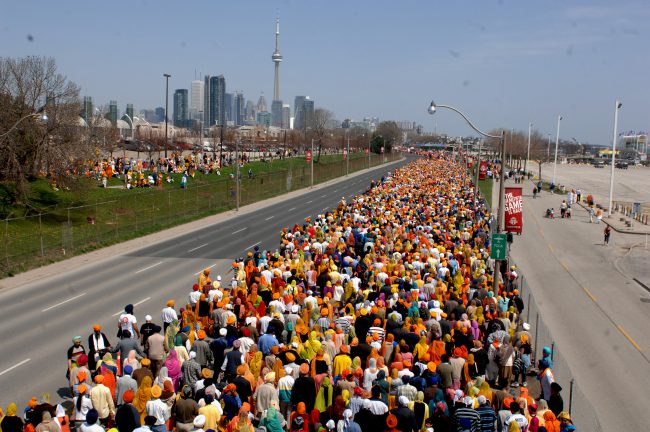Mukhbir Singh says he was waiting in line to enter Montreal’s Bell Centre to take in the Canadiens-Penguins game on Thursday, when a fellow Habs fan standing in line asked him if he was Sikh.

When Singh replied in the affirmative, the man promptly asked him a question about Sikh extremism.
“The first question was, ‘Is there a terrorism issue? Is this actually happening in your community?'” Singh told Global News.
He said the man was polite and not threatening in his tone. But what struck Singh was that the first thing the man thought of when he saw a Sikh was terrorism.
“I don’t think it was a mean-spirited comment or anything. It’s just the association… I had to take a step back and process that. It was surprising.”
The next day, Singh tweeted about the incident using the hashtag #AskCanadianSikhs, saying that while he was taken aback, he realized it was important for Canadians, especially those in the media and politics, to talk to regular Sikhs more frequently.
https://twitter.com/mukhbir_/status/974701856357343232
In addition to being an avid Habs fan, Singh also happens to be the president of the World Sikh Organization (WSO), a non-profit organization with headquarters in Ottawa and New York.
Spotting an opportunity, Singh and the WSO decided to turn #AskCanadianSikhs into a campaign encouraging Sikhs to share their perspectives about their community and its portrayal.
COMMENTARY: Canada’s media oversimplifies Indo-Canadian relations
The issue of Sikh extremism has received plenty of attention in recent weeks.
In addition to the fiasco surrounding former militant Jaspal Atwal‘s invitation to Canadian government events in India during Prime Minister Justin Trudeau’s state visit, there’s also the ongoing controversy surrounding NDP leader Jagmeet Singh‘s alleged ties to Sikh separatists, and his recent — and delayed — admission that Sikh extremist Talwinder Singh Parmar was responsible for the 1985 Air India bombing.
WATCH: Global News asks why Jaspal Atwal won’t take questions in heated exchange with lawyer

But Mukhbir Singh says the perspectives of regular Canadian Sikhs have been ignored, even as experts and politicians speak out on their behalf.
“I think the biggest frustration has been that the voice of the community has not been heard,” he said. “The #AskCanadianSikhs campaign was launched to give Canadian Sikhs a voice so they have the ability to tell their own stories.”
Harpreet Singh was one of those to answer the social media call. A Brampton, Ont.-born Sikh who now lives in New York, Harpreet tweeted that he and his wife have lately started to doubt his long-held assumption of Canada being more tolerant than the United States.
Harpreet says he has been targeted by racial slurs and attacks in the U.S., and that his friends in Canada are also starting to grow wary.

Get daily National news
“There is now more of a sense that regardless of where we live, the challenges will be the same,” Harpreet told Global News. “Being a very proud Canadian, I continue to plead my case to my wife — even though I have slowly begun to doubt it myself.”
Harpreet says Sikhs’ calls for justice for the victims of the 1984 anti-Sikh riots in India shouldn’t be conflated with extremist sympathies.
“There is a general consensus that justice has not been served for the Sikhs slaughtered in the tens of thousands in 1984 and beyond,” he said. “Whenever this issue is raised, there is an immediate backlash framed around terrorism and extremism without a shred of evidence to back these claims. It is all too common in India, and now in Canada.”
READ MORE: Jagmeet Singh now says he accepts that Sikh extremist masterminded Air India bombing
Angie Rehal, a Brampton-based small business owner, also tweeted using the hashtag. She says she was a teenager living in Brampton when the 1984 riots took place in her birth province of Punjab in India, and that people in her community lost friends and family in the pogroms.
“We lost people from our high school and around our area so it was very hurtful for us, a very sad time,” she told Global News. “We were 17 years old and we didn’t understand what the hell just happened.”
Rehal said she usually refrains from tweeting about politics, but couldn’t hold back on this occasion, because she worries that prejudices that should have been consigned to the past might rear their ugly heads again if left unchallenged.
She added that she’s worried that harmful generalizations about Sikhs and extremism could eventually manifest in racist backlash in Canada’s communities.
“If it keeps happening, yeah it could bring on racism and people getting hurt and violence and stuff like that. This is how it starts, right?”
READ MORE: Pro-separatist Sikh Canadians praise Trudeau, slam Indian government and PM Modi
Balpreet Singh, legal counsel and spokesperson for the WSO, says it’s important to recognize that there’s a diversity of opinions within the Sikh community on the issue of Khalistan (the idea of a Sikh state).
Some use the notion of Khalistan as a jumping-off point to discuss how to spread Sikh values, Singh said, while others literally want a Sikh ethnostate to be carved out of India’s Punjab province.
“If you ask 10 different Sikhs what Khalistan is, they’ll give you 10 different answers,” Singh told Global News.
https://twitter.com/2largeharj/status/975005780024819718
Singh says the #AskCanadianSikhs campaign aims to flesh out the diversity of opinions, and help placate what he calls “a sense of unease” in the community.
“We don’t necessarily agree with all of them or any of them, but it’s important for people to recognize that Sikhs believe different things and there’s a whole variety of Sikh opinions that should be probed before reporting on these issues,” Singh said.
“We’re a very visible minority so people already notice us, and if the frameworks through which they recognize us are Air India or extremism or radicalism, that affects our daily life.
“We look different. We stand out in a crowd. But the best way to understand us is to actually engage with us. So if you have a question about the Sikh community, the best way to handle it is to just ask your Sikh neighbour or co-worker. We just want to make sure that our Canadian friends don’t look at our community through the framework of radicalism and extremism.”
Singh says he’s especially concerned about younger Sikhs being targeted for events that took place before they were even born.
“The people that are most affected are our youngsters who have no idea what people are talking about when they’re referencing things that happened over 30 years ago,” he said.
“They’re confused, they’re upset, they thought that we had gone so far in this country to make a place for ourselves, and over the course of one month we find ourselves on the back step and having to defend our reputation once again.”








Comments